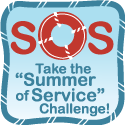Would you rather be sick or be a caregiver? I just recently determined my answer.
QUESTION 1: "To Be Sick...?"
I was diagnosed with epilepsy a week after my 14th birthday. It seems to me that this event was the origin of what has become a series of traumatic health experiences in my life. Since that time, I have broken my jaw in three places, fractured my skull, developed and had removed an epidural hematoma on my brain and a polinidol cyst on my tail bone (not at the same time, thank goodness). I also had stitches that burst after delivering Connor that could not be repaired and subsequently got infected, my front teeth broken so badly in a fall that I had to get six veneers to the tune of $10,000 (gotta love that dental insurance), and a tubal pregnancy run amok that ended in emergency surgery and the removal of one fallopian tube. I also had pneumonia, but that was the least of my worries. Finally, I am not even going to attempt to add everyday things like my yearly bout with strep throat, bronchitis, eczema, and whatever the heck is wrong with my stomach. That would for sure make me sound like a hypochondriac.
My point is:
If "they" gave honorary degrees in trauma or illnesses, I would certainly qualify. In fact, I would almost venture to say that I could be a resident expert.
These traumatic times have become a part of my identity. When I introduce myself, I almost want to add "and I have regular bouts of trauma" to the end of "my name is Jyl, I am originally from Mesa Arizona, have a wonderful husband and two beautiful boys, and a degree in English from BYU (I won't tell you how long it took me to earn it or how much I still owe for it after 10 years until I know you better.)."
But it is not socially acceptable to air all your dirty laundry with people (and yes, epilepsy and head surgeries and cosmetically altered teeth are considered dirty laundry in most circles), so I usually wait until I move beyond the superficial to more the substantial parts of relationships to let out these skeletons from behind my closet door.
QUESTION 2: "...Or to Be a Caregiver?"This summer, while enjoying an exceptionally long period of great health, my youngest son Connor got sick and for the first time, I transitioned from the sick one to the caregiver.

Here's the sequence of events that followed:
Monday (pre-doctor-appointment): Connor goes to doctor. Has fever. Threw up twice the night before. Is drinking, but not eating. Is lethargic, but has no other symptoms.
Monday: (at the doctor's): White blood cell count exceeds the 10,000 mark. Doctor recommends a visit to the local hospital for more testing. Thinks it may be pneumonia.
Monday (post-doctor-appointment): We start, what begins, a week full of testing, pricking, probing, and anxiety over the health of our little Leo. He was admitted to the hospital on Monday afternoon and diagnosed with severe dehydration. Treatment? IV fluids. For the next act: Let the testing begin! Pneumonia? Negative. E Coli? Negative. Sal Manila? Negative. Other unnamed bacterial infections? Negative. Question? Did something cross over into the blood stream? Answer: Absolutely! Question: What was it? Answer: We don't know, but we are doing more than 200 tests and called in an infectious disease specialist to find out. Preliminary treatment to unknown bacterial infection? Strong antibiotic. Reaction? CDIF. Question? What is CDIF? Answer: When an antibiotic kills all of the bacteria except the resistant dudes and they start colonizing. Reaction? The worst tummy pain known to a 5-year-old--or man, in fact. Treatment? Another potent antibiotic--flagile. Result? Immediate positive reaction. Diagnois? CDIF, the secondary problem, is under control. The primary problem? Still unknown, but the boy is hydrated, healthy, happy, and good to go (and is still going strong after a month).
ANSWERBack to my original question... To be sick or to be a caregiver? It doesn't take me even a second to formulate my answer: To be sick! While the tasks necessary for a caregiver aren't difficult, the emotional roller coaster ride that accompanies such an experience is terrifying, nauseating. On roller coaster rides, I sometimes question--even if briefly: Will the safety bar break? Will technical difficulties arise? Will the person sitting up a few rows throw up and if so, will it hit me in the face? Will one of my important belongings--like my camera--fall out?
Similar questions popped into my head when Connor entered the hospital and spent the first 4 days not progressing at all: Will he get better? Will they find a diagnosis? What if he has cancer? What if it is terminal? How could I live without him? What would this mean for our family? How do I make sense of this?
Then I cry out: Please just let me be the sick one. The familiarity of that routine is so much better than the unknown and potential sadness I could feel from this. I don't think I want to learn this lesson yet. It was one of those rare, but powerful glimpses into the life of my mother who raised not one, but six children.























